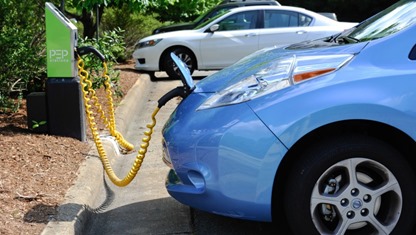Researchers Take Big-Data Approach to Estimate Range of Electric Vehicles
Researchers from North Carolina State University have developed new software that estimates how much farther electric vehicles can drive before needing to recharge.
October 30, 2014 ![]() NC State ECE
NC State ECE
Researchers from North Carolina State University have developed new software that estimates how much farther electric vehicles can drive before needing to recharge. The new technique requires drivers to plug in their destination and automatically pulls in data on a host of variables to predict energy use for the vehicle.
“Electric cars already have range-estimation software, but we believe our approach is more accurate,” says Dr. Habiballah Rahimi-Eichi, a postdoctoral researcher at NC State and lead author of a paper on the work.
“Existing technologies estimate remaining range based on average energy consumption of the past 5 miles, 15 miles, etc.,” Rahimi-Eichi says. “By plugging in the destination, our software looks at traffic data, whether you’ll be on the highway or in the city, weather, road grade, and other variables. This predictive, big-data approach is a significant step forward, reducing the range estimation error to a couple of miles. In some case studies, we were able to get 95 percent range estimation accuracy.”
The software takes all of the data related to the route between starting point and destination and uses big data techniques to determine which pieces of information are important and extract key features that can be plugged into an algorithm to estimate how far the vehicle can go before recharging.
But two other variables are also plugged into the algorithm: the performance characteristics of the vehicle and its battery; and the amount of charge remaining in the battery. The state of charge is estimated using a patented technique developed by Rahimi-Eichi and Dr. Mo-Yuen Chow in 2012. Chow is a professor of electrical and computer engineering at NC State and a co-author of the paper.
“People have a lot of ‘range anxiety’ in regard to electric vehicles – they’re afraid they’ll get stuck on the side of the road,” Chow says. “Hopefully, our new range estimation software will make people more confident about using electric vehicles.”
The paper, “Big-Data Framework for Electric Vehicle Range Estimation,” will be presented at the 40th Annual Conference of the IEEE Industrial Electronics Society, being held Oct. 29 to Nov. 1 in Dallas, Texas.
Credit: Adapted from the NC State News Article “Researchers Take Big-Data Approach to Estimate Range of Electric Vehicles” by Matt Shipman

